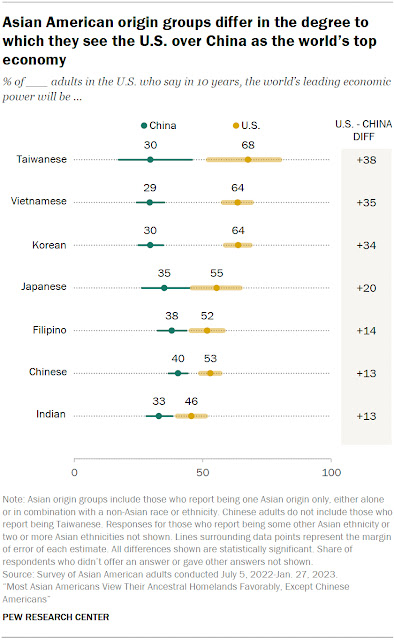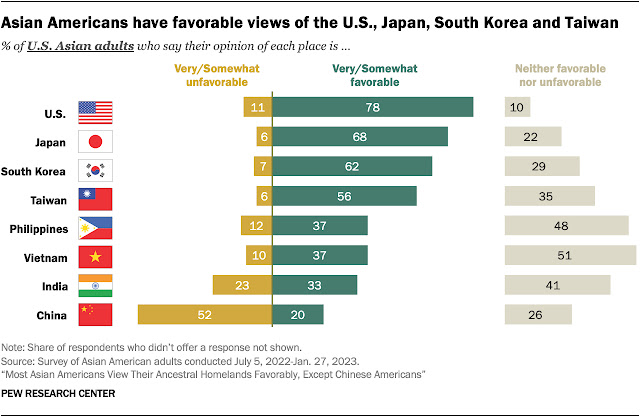
It's sort of a "thing" for Taiwanese leaders and presidential hopefuls to publish opinion pieces in major American newspapers. The purpose isn't just to raise international awareness but to make the case to the world, in English, for why they should lead the country or why their vision for Taiwan's future is in the world's best interests.
I'm not sure many would-be leaders of other countries find it important to do this, but Taiwan is in a unique enough geopolitical position that, right or wrong, Taiwanese leaders feel the need to garner not just local but global support and justify both themselves and -- frankly -- Taiwan's continued existence to the world.
So far, William Ching-te Lai has had his moment in the Wall Street Journal. WSJ's subscription fees are far too high, but it can be read with a translation here (on Facebook) and a summary on RTI. It's pretty standard, an attempt to project stability and maturity as the DPP seeks to transition from a Tsai administration to one headed by Lai. Stability matters to the party named -- possibly apocryphally -- "troublemakers". It's not a fair description: like or dislike the DPP, the only thing "troublesome" about them is that they have consistently championed Taiwanese identity and their fundamental perspective on Taiwan now mirrors the majority consensus. Basically, okay, cool. But not that interesting.
As far as I know the KMT's Hou and TPP's Ko have not published anything similar -- I've been busy and in poor health recently, so if I've missed something let me know -- but Foxconn chairman, Guy Who Wants To Be President and all-around massive asshole Terry Gou has, in the Washington Post. Again, you can read a summary on RTI, including a response by the Ministry of Foreign Affairs.
It's exactly what you'd expect: we need the One China framework as a means to push forward talks with China, accepting the 1992 Consensus as a standing and valid framework, and pursuing peace by negotiating directly with China. He insists this is how Taiwan can preserve all it holds dear and China need not be an enemy -- forgetting of course that China has made it clear that their only goal is to annex Taiwan, there are no "talks" or bargains that will change this goal, and that we already know what happens when China promises to respect local governance...thanks to watching the tragedy of Hong Kong.
Overall, I have little to say about this that Michael Turton hasn't already said on Twitter. Turton points out that Gou's policy position was the standard between 2008 and 2016, under Ma Ying-jeou. You know, the least popular elected president in Taiwan's admittedly short democratic history. That policy not only failed -- China did not back off its ultimate subjugationist goal, the economy did not improve, and "talks" led basically to trussing up Taiwan to prepare it for annexation -- but it wasn't popular, either.
In fact, to me that's one of the key points: Gou tries to make "abandoning" the "One China framework" the actions of an errant DPP, a political ploy. He completely fails to register that Taiwan does not pursue talks under a "One China" framework because the people of Taiwan do not want it. The vast majority do not want to be part of China. Most consider the status quo to be sufficient qualification to consider Taiwan independent. A large majority do not identify as Chinese at all, and those that identify as both almost always prioritize Taiwanese identity. Almost no one identifies as solely Chinese, and almost no one wants to move toward unification.
This isn't the dastardly DPP's doing. It's the general consensus of the Taiwanese electorate.
I recommend reading the whole thread, but here's my favorite bit:
10/ (a) Taiwan is supposed to take control of its destiny ... by annexing itself to a giant expansionist power. History has no examples of states swallowed by a much larger power "taking control of their destiny" ..
— michaelturton (@michaelturton) July 18, 2023
There's another thing worth talking about though. It's referenced often but, to my mind, not broken down enough. Gou leans strongly on the 1992 Consensus, supposedly an agreement reached between representatives from Taiwan and China that both sides agreed that there was indeed "one China", and provided a basis, apparently perpetually, for cross-strait interaction.
Gou's article unwittingly acknowledges this:
The current Democratic Progressive Party leadership has only made the situation more tense. Under the so-called 1992 Consensus, Taiwan and China agreed to accept the framework of “one China” — although the parties have differing interpretations of that term — and held discussions that over the years resulted in a number of productive agreements.
If you can't agree on the meaning of a term that defines your framework, then saying "we agree to the framework" is meaningless, both functionally and semantically. For there to be a consensus on "one China" of any sort, the two sides would have needed to agree on what "one China" means. They didn't. So, no consensus:
According to the piece from the former deputy chair of Taiwan’s Mainland Affairs Council (MAC) and deputy chair of the Straits Exchange Foundation (SEF), they “reached a consensus with respect to the content of the agreement, but the Mainland insisted on putting the ‘one China’ principle in the preface of the agreement, but Taiwan strongly opposed this provision.”“The agreement” referred to above is a 1991 negotiation on document authentication and registered mail between the two countries, basic communications. But the PRC insisted that even something so trivial and basic include the PRC’s “one China” definition. The KMT side rejected that.Kao’s discussion observes that at the November 1992 meeting in Hong Kong both sides made five proposals but each rejected the other’s ideas. The KMT side followed up with three more proposals, but those too fell on deaf ears. The PRC delegation returned to the PRC.“Therefore,” says Kao, “no consensus was reached during the 1992 talks as the negotiations broke down.”
China has not even said that they agree that there are, or can be, "differing interpretations" of the term "one China"! For the two sides to say that they agreed in 1992 that there was such a thing as "one China" but the details of what that is need to be worked out, well, that would be some kind of agreement, though not a full consensus. But they didn't even do that -- you can't say "the two sides disagree on the interpretation but there is a consensus" when the two sides don't even agree that it is possible to disagree on interpretation!
The MAC indicated that, during the formal meeting between the leaders of the two sides on November 7, President Ma directly told the Mainland leader that the consensus reached by the two sides in November 1992 was that "the two sides of the Taiwan Strait insist on 'one China,' but differ as to what that means, and each side could express its interpretation verbally." This position accords with the ROC Constitution. President Ma has been consistent in his stance on the "1992 Consensus of one China, with respective interpretations." The core of this position is to highlight the ROC's sovereignty and Taiwan's dignity. The Mainland should seriously and pragmatically face up to this. [Emphasis mine.]
If China "should...face up to" what the 1992 Consensus means, then it has not actually accepted the KMT's definition of what the consensus even is. If you can't agree on the content of a consensus, it is not a consensus.
Su made the remarks yesterday in response to Lee who, during a Taiwan Solidarity Union seminar on Monday, said that the so-called "1992 consensus" was a fiction."Little monkey boy's trying to make up history," Lee said of Su, daring him to respond on the matter.
This is, of course, why nothing I've found written about Taiwanese history or democratization between 1992 and 2000 mentions the supposedly "historic" consensus. Odd, if said consensus actually happened, and was as important as the KMT and Gou insist it is.
He directly said it did not, and called the guy who made up the term a "little monkey boy"!
The final reason why the 1992 Consensus is a fiction isn't so much that it never existed (though it never did), but that even if it did, it was an agreement reached not between Taiwan and China, representing the will of their respective populations. It was a meeting between the KMT and CCP -- political parties in power, but not elected. If we're being generous and saying it was two governments, not two parties, that met in 1992, it still doesn't matter.
China has remained a dictatorship but Taiwan, notably, has not. Agreements reached by the KMT dictatorship before democratization cannot and should not be forced on Taiwanese in perpetuity, in a democratic system where they have the right to reject the work of past dictators. The people of Taiwan never agreed to this "one China" framework. They were never given a say. Now, they have a say in their own government, so it's wrong to insist that all of the One China nonsense set in motion by the KMT must be forever binding.
Why should it be? I can't think of a single good reason. If the people of Taiwan don't want it, then that should be that. I think after the disaster of Ma's administration and the success of Tsai's, and the fact that polls consistently show low support for pro-China rhetoric, shows that the electorate does not want "one China" anything.
If they did, then that might be different. But they don't, and probably won't -- ever again, if they ever did. This isn't "because of the DPP'" or something the DPP brainwashed people into thinking: changing perspectives on sovereignty and identity have famously not followed electoral trends. If anything, the trends have brought the DPP to power, not the other way around.
That, again, assumes there actually was a consensus, leading to a framework. To repeat, there wasn't. The only thing we can say with certainty is that representatives of the KMT and CCP dictatorships held meetings in 1992 -- not even the outcome of those meetings is clear.
Taiwanese also know that no, "Beijing, Washington and Taipei" do not "share responsibility" for current tensions. They're not Washington Post readers predisposed to believing that the US is terrible so China must be alright, and Taiwan sure sounds troublesome. They're caught in this conflict, and they know exactly who is to blame: Beijing, and Beijing alone. They know who the provocateur is: Beijing, and Beijing alone. Not Taipei for simply wanting to govern itself in peace, and not Washington for thinking, finally, after all these years, Taiwanese have this right.
So it's our job as informed readers to sniff out horseshit when we see it. And what Gou is trying to sell you is absolutely that.









